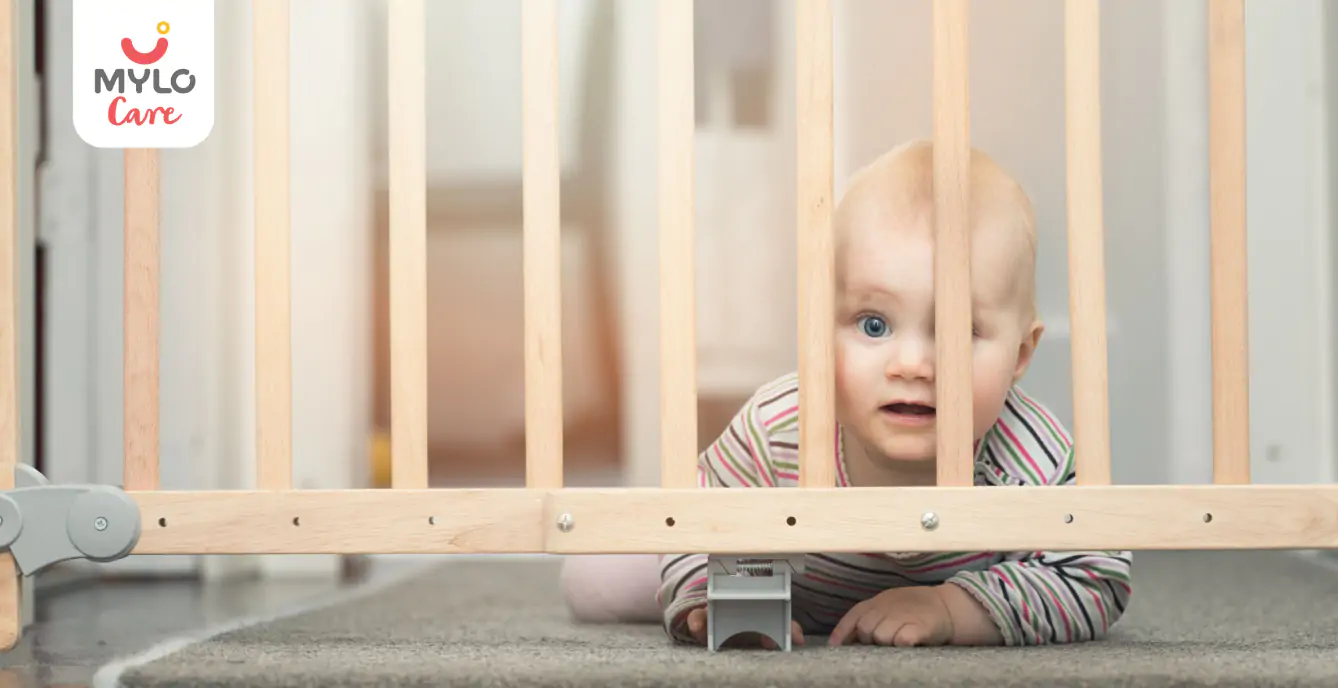Get MYLO APP
Install Mylo app Now and unlock new features
💰 Extra 20% OFF on 1st purchase
🥗 Get Diet Chart for your little one
📈 Track your baby’s growth
👩⚕️ Get daily tips

OR


Article Continues below advertisement
- Home

- Lactose Intolerance in Babies: A Parent’s Guide to Identifying and Managing it
In this Article
- What is Lactose Intolerance in babies?
- What are the Symptoms of Lactose Intolerance in Babies?
- How to Diagnose Lactose Intolerance in Babies?
- History
- Elimination Diet
- Lactose Breath Test
- Stool Acidity Test
- Lactose Intolerance in Infants Treatment
- Lactose-Free or Lactose-Reduced Formulas
- Breastfeeding Modifications
- Lactase Supplements
- Probiotics
- Monitor Calcium and Vitamin D Intake
- How to Choose Lactose Free Milk for Babies?
- Age-appropriate formula
- Read the labels
- Allergen Considerations
- Brand Reputation
- How to Manage Lactose Intolerance in Babies through Diet?
- Modify your diet
- Seek calcium alternatives
- Maintain a balanced diet
- Final Thoughts
Baby Care
 131
131Lactose Intolerance in Babies: A Parent’s Guide to Identifying and Managing it
Updated on 17 July 2023
Once a lively and spirited baby, Jia's joyful demeanor took a sudden turn in the past few months. She became fussier, with a bloated tummy and colic-like symptoms. Excessive gas troubled her, and her weight gain didn't match her age. Desperate for answers, doctors ran allergy tests, but to no avail. It was only recently that we discovered she had lactose intolerance in babies.
Shocked by the revelation, we found solace in our doctors' advice of lactose-free formula. Thankfully, Jia is now thriving and adjusting well. If you find yourself in a similar situation, fret not and learn more about the symptoms of lactose intolerance in babies, lactose intolerance in infants treatment, lactose free baby formula and many other aspects.
What is Lactose Intolerance in babies?
Lactose intolerance is a condition in which a baby’s body has difficulty digesting lactose, a sugar present in milk and dairy products. Normally, the enzyme lactase breaks down lactose into simpler sugars (glucose and galactose) that can be easily absorbed by the body. However, in babies with lactose intolerance, there is insufficient production of lactase, leading to undigested lactose in the digestive system.
Article continues below advertisment
Lactose intolerance can be temporary or persist as the child grows older. Temporary lactose intolerance can occur due to factors such as premature birth, illness, or intestinal infections. In such cases, the condition usually improves as the baby's digestive system matures or recovers.
You may also like : CMPA (Cow's Milk Protein Allergy): Identifying Symptoms and Understanding Treatment
What are the Symptoms of Lactose Intolerance in Babies?
Lactose intolerance in babies can present a variety of symptoms, which typically manifest shortly after consuming milk or dairy products. Here are some common signs and symptoms to look out for:
-
Digestive discomfort like bloating, gassiness, and abdominal pain or exhibit signs of colic.
-
Article continues below advertisment
-
Increased gas
-
Vomiting
-
Weight loss or poor weight gain
-
Irritability and crying
It's important to note that these symptoms can also be caused by other factors or conditions, so it's crucial to consult a healthcare professional for an accurate diagnosis.
Article continues below advertisment
How to Diagnose Lactose Intolerance in Babies?
Common approaches used by healthcare professionals to diagnose lactose intolerance in infants:
-
History
The doctor will take medical History and perform physical examination to check the baby.
-
Elimination Diet
In some cases, the doctor may suggest an elimination diet for the mother (if breastfeeding) or a temporary switch to lactose-free formula. This involves removing lactose-containing foods from the baby's diet for a certain period to observe any improvement in symptoms. If the symptoms subside during this time, it can indicate lactose intolerance.
-
Lactose Breath Test
This test measures the levels of hydrogen in your baby's breath before and after consuming a lactose-containing substance. Elevated levels of hydrogen after ingestion suggest poor lactose digestion, indicating lactose intolerance.
-
Stool Acidity Test
This test examines the acidity of your baby's stool after consuming lactose. High acidity levels can indicate undigested lactose and potential lactose intolerance.
Article continues below advertisment
Lactose Intolerance in Infants Treatment
The treatment of lactose intolerance in infants mainly involves managing their diet and ensuring they receive proper nutrition. Let’s discuss some common strategies for managing lactose intolerance in infants
-
Lactose-Free or Lactose-Reduced Formulas
These specialized formulas are designed to provide all the necessary nutrients while minimizing lactose intake.
-
Breastfeeding Modifications
If you are breastfeeding, you may need to modify your diet to reduce lactose intake. This typically involves avoiding or reducing lactose-containing foods such as dairy products.
-
Lactase Supplements
In some cases, your doctor may recommend lactase drops or tablets to aid in lactose digestion.
-
Probiotics
Some studies suggest that specific strains of probiotics may help alleviate symptoms of lactose intolerance in infants.
Article continues below advertisment
-
Monitor Calcium and Vitamin D Intake
Your doctor may recommend alternative sources or supplementation to meet your baby's nutritional needs.
How to Choose Lactose Free Milk for Babies?
When choosing lactose-free baby formula, it's important to consider their age, nutritional needs, and any specific dietary requirements.
-
Age-appropriate formula
Pick an age-appropriate lactose-free formula to provide necessary nutrients to the baby.
-
Read the labels
Check the nutritional label of the lactose-free milk or formula to ensure it provides a balanced and complete nutritional profile.
-
Allergen Considerations
Some babies may have additional food allergies or sensitivities. In such cases, choose lactose-free milk or formula that is free from other common allergens, such as soy, gluten, or cow's milk protein.
Article continues below advertisment
-
Brand Reputation
Opt for trusted and reputable brands of lactose-free milk or formula to ensure safety and nutritional value.
Remember, while lactose free formula can be a suitable option for babies with lactose intolerance, it's important to consider the overall nutritional needs of your baby.
You may also like : Breast Milk vs Cow Milk: Making an Informed Choice for Your Baby's Wellbeing
How to Manage Lactose Intolerance in Babies through Diet?
Managing lactose intolerance through diet involves making specific modifications to their feeding routine.
-
Modify your diet
Limit or avoid lactose-containing foods such as milk, cheese, yogurt, and other dairy products. Be cautious of hidden sources of lactose in processed foods.
Article continues below advertisment
-
Seek calcium alternatives
Since dairy products are a primary source of calcium, consider incorporating other calcium-rich foods into your diet, such as leafy greens, fortified plant-based milks, and calcium supplements if necessary.
-
Maintain a balanced diet
It's crucial to ensure you are still receiving adequate nutrition while modifying your diet. Consult with a healthcare professional or a registered dietitian to ensure you maintain a well-balanced and nutritious eating plan.
Final Thoughts
In conclusion, managing lactose intolerance in babies requires careful attention to their diet and nutritional needs. Recognizing the symptoms and seeking professional guidance are crucial steps in providing appropriate care for your little one. Lactose free milk for babies can help with lactose intolerance and help the baby thrive and grow. Working closely with healthcare professionals, including pediatricians and registered dietitians, ensures personalized guidance and regular monitoring of your baby's progress.
References
1. Heyman, M. B. (2006). Lactose Intolerance in Infants, Children, and Adolescents. PEDIATRICS.
Article continues below advertisment
2. Malik, T. F., & Panuganti, K. K. (2023). Lactose Intolerance. PubMed; Stat Pearls Publishing.



Written by
Madhavi Gupta
Dr. Madhavi Gupta is an accomplished Ayurvedic doctor specializing in Medical content writing with an experience of over 10 years.
Read MoreGet baby's diet chart, and growth tips

Related Articles
Understanding RSV And Its Long-Term Impact On Lung Health In Preterm Infants
Preventing Respiratory Syncytial Virus (RSV) In Preemies: Essential Steps For New Parents
How Respiratory Syncytial Virus (RSV) Impacts Premature Babies Differently: What Every Parent Needs To Know
Adverbs: A Comprehensive Guide to help small children learn the usage of adverbs
Related Questions
Influenza and boostrix injection kisiko laga hai kya 8 month pregnancy me and q lagta hai ye plz reply me
744 views
Hai.... My last period was in feb 24. I tested in 40 th day morning 3:30 .. That is faint line .. I conculed mylo thz app also.... And I asked tha dr wait for 3 to 5 days ... Im also waiting ... Then I test today 4:15 test is sooooo faint ... And I feel in ma body no pregnancy symptoms. What can I do .
751 views
Baby kicks KB Marta hai Plz tell mi
767 views
PCOD kya hota hai
1317 views
How to detect pcos
55 views
Related Topics
RECENTLY PUBLISHED ARTICLES
our most recent articles

Medical Procedures
TESA IVF: How This Procedure Can Help You Achieve Your Dream of Parenthood
(126 Views)

Sensory Development
How Can You Encourage Sensory Play for Your Baby and What are Its Benefits?
(2,513 Views)

IVF Pregnancy
After How Many Weeks IVF Pregnancy Is Safe: Understanding The Ideal Timeline
(930 Views)

Exploring the Senses: 9 Incredible Benefits of Sensory Play for Your Child's Development
(3,176 Views)

Childproofing
The Ultimate Guide to Childproofing Your Home
(396 Views)

Books
Start Their Love for Reading Early: The Best Books for Baby's First Library
(2,277 Views)
- CMPA (Cow's Milk Protein Allergy): Identifying Symptoms and Understanding Treatment
- Birth Control Options While Breastfeeding: Balancing Parenthood and Contraception
- Period During Breastfeeding What Every New Mother Should Know
- Role of Stories and Rhymes in Your Baby’s Brain Development
- Intracytoplasmic Sperm Injection (ICSI) How It Can Help Treat Male Infertility
- Baby Sleeping While Breastfeeding: Understanding the Causes and Solutions
- Lump in Breast During Breastfeeding How to Identify, Treat, and Prevent Lump Formation
- Understanding Down Syndrome: A Comprehensive Guide for Parents
- No Breast Milk After Delivery: What to Do & What are the Factors Responsible
- Lactation Failure: A Comprehensive Guide to Understanding the Causes and Solutions
- Breast Pain During Pregnancy: What to Expect and How to Find Relief
- Baby Spit Up: The Ultimate Guide to Causes, Prevention, and Management
- Unexplained Infertility: Breaking Down the Factors and Finding Solutions
- Mulethi: Unraveling the Therapeutic Potential of Licorice Root for Your Overall Health


AWARDS AND RECOGNITION
Mylo wins Forbes D2C Disruptor award
Mylo wins The Economic Times Promising Brands 2022
AS SEEN IN
















At Mylo, we help young parents raise happy and healthy families with our innovative new-age solutions:
- Mylo Care: Effective and science-backed personal care and wellness solutions for a joyful you.
- Mylo Baby: Science-backed, gentle and effective personal care & hygiene range for your little one.
- Mylo Community: Trusted and empathetic community of 10mn+ parents and experts.
Product Categories
baby carrier | baby soap | baby wipes | stretch marks cream | baby cream | baby shampoo | baby massage oil | baby hair oil | stretch marks oil | baby body wash | baby powder | baby lotion | diaper rash cream | newborn diapers | teether | baby kajal | baby diapers | cloth diapers |








